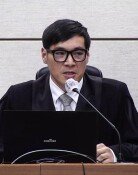Government Insists Economy Will Turn Around Soon, But
Government Insists Economy Will Turn Around Soon, But
Posted August. 12, 2005 03:04,
Korea stands at the crossroads; a prolonged recession or economic recovery.
Surging oil prices, stagnant consumption, dampened facility investment and mounting inflationary pressures are holding back the nations economy.
The government has tried to assure the public that the economy will be revived in the latter half of this year, but has failed to convince the market.
The continued rise in oil prices has forced households to tighten their belts and hurt the profitability of businesses. Stagnant consumer and investment sentiment has dimmed the prospects of a pick-up in domestic demand. If domestic demand remains weak and exports continue to slow down, the nation may find it difficult to meet its four percent growth target.
The government plans to allocate supplementary budget money to stimulate the economy, but this can result in a deterioration of the nations financial health.
Oil Prices Hit a New Record High Every Day-
Surging oil prices remain the largest obstacle on the road to economic recovery.
The price of Dubai crude oil, which the government estimated at an average of $35 last year when it drew up an economic management plan for this year, has broken the $56 level.
On August 10, Dubai crude oil was traded at $56.37 per barrel at the local commodity market. It reached $50 per barrel on April 4 for the first time and $55.40 on August 8, breaking the threshold of $55.
Monthly average prices of Dubai crude oil are on a sharp rise, recording $45.41 in May, $51.06 in June, $ 52.84 in July and $55.20 as of August 10.
West Texas Intermediate (WTI) also surged to $64.07 per barrel on August 10.
Yoo, Byung-gyu, who heads the economy division of the Hyundai Research Institute, forecast, The greatest uncertainty is caused by the imbalance between supply and demand. But it will take a while before we can see this problem goes away. So the oil prices are expected to remain high for the time being.
Will the economic recovery be delayed?
As the government has stressed repeatedly, a nations economy hinges on the public sentiment to a large degree. But consumer and business sentiments are getting worse, and the job market is showing no sign of improvement.
According to Employment Trends in July which the National Statistical Office released on August 11, the unemployment rate in last month stood at 3.7 percent, the same as one year ago, but the number of people without jobs has increased 1.2 percent or 23,000 to 888,000 people.
Especially the number of people who gave up searching for a job because they had failed to land satisfactory jobs has reached 141,000, the highest number in four years and five months since February, 2001 when the number hit 149,000.
The unemployment rate among young Koreans between 15 to 29 years old was 8.3 percent, rising for two months in a row.
As the job market remains tight, there is little chance that household income will grow and consumption will recover.
Indeed, consumer sentiment has deteriorated.
The Consumer Expectation Index, which gauges consumers expectations of economic recovery and the financial status of their families six months from now, dropped 0.2 percent to 95.2 in July from the previous month. It has decreased for four consecutive months.
The year-on-year growth of business facility investment surged from -0.2 percent in April to 7.7 percent in May, before it plunged again to -2.8 percent in June.
Concerns are growing over the nations financial health.
The government and the ruling party decided to allocate supplementary budget money amounting to more than five trillion won to make up for the less-than-expected tax revenues due to the economic slowdown.
Kang Bong-gyun, senior vice chairman of the policy committee of the ruling Uri Party said in a meeting with the Ministry of Planning and Budget on August 11, We need supplementary budget money because the lower growth rate this year has resulted in decreased tax revenues, adding, We will be four trillion won short in tax revenues. And when the spending for the lowest-income bracket is factored into the sum, we may need more than five trillion won for supplementary budget.
Especially, since there is no surplus budget left and no room to borrow from the Bank of Korea, the government plans to issue national bonds to finance the supplementary budget.
As a result, the national debt, which surpassed the 200 trillion won mark for the first time in history with 203,100 billion won last year, is set to grow even further, putting the nation in a worse financial situation.
Concerns are growing over the possible vicious cycle of economic slowdown, insufficient tax revenues, allocation of supplementary budget, growing national debt, increasing burden on taxpayers and undermined growth potential.
Kim, Jun-young, an economics professor at Sungkyunkwan University, noted, The national debt is set to rise if the government borrows money to allocate supplementary budget money when it is uncertain when the economy will recover.
Chi-Young Shin Jong sik Kong higgledy@donga.com kong@donga.com





![“설거지해도 그대로”…냄비 ‘무지개 얼룩’ 5분 해결법 [알쓸톡]](https://dimg.donga.com/c/138/175/90/1/wps/NEWS/IMAGE/2026/01/15/133164664.3.png)

